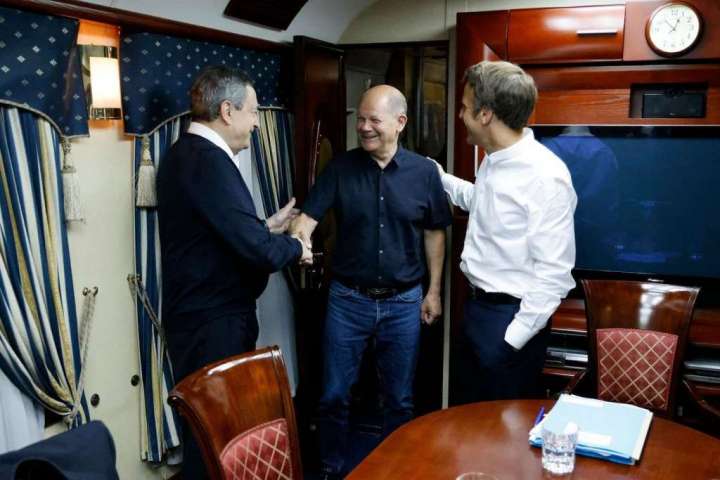BERLIN — The leaders of France, Germany and Italy traveled to Ukraine on Thursday during a decisive time in the war, as President Volodymyr Zelensky pleads for more weapons in the struggle to fend off Russia’s assault in the east.
Leaders of France, Germany and Italy make first wartime trip to Kyiv

The three leaders “want to send a strong signal of support and solidarity” to Zelensky and the Ukrainian people during these “dire times,” German government spokesman Steffen Hebestreit tweeted, along with a photo of Scholz arriving on the platform in Kyiv.
The trip by the leaders of the European Union’s three largest economies comes as Ukraine is in negotiations to begin the process of joining the 27-member bloc. Zelensky has also warned that Ukraine is suffering “painful losses” in the eastern region of Donbas, and he has urged Europe to provide more military support.
He has said that if defense aid is not significantly increased, the war risks devolving into a bloody stalemate as Russian forces continue ground assaults on the strategic eastern city of Severodonetsk. President Biden on Wednesday responded to calls from Ukraine for more weapons with an additional $1 billion in security assistance to the country.
But Europe is under pressure to do more. Germany, in particular, is under fire for dragging its feet on weapons shipments. Berlin has yet to deliver any heavy weapons to Ukraine, despite promising to do so nearly two months ago.
The German Defense Ministry has said that 15 promised self-propelled Gepard antiaircraft guns will be delivered in July, while Panzerhaubitze 2000 howitzers will be sent “soon.”
Scholz’s visit comes after months of mounting pressure to do so. He initially said that he wouldn’t be going after Ukraine disinvited German President Frank-Walter Steinmeier. He has also said he has no desire to simply visit for a photo opportunity — raising expectations for an announcement during the trip.
The European Union’s executive arm is expected to decide in the coming days on whether to recommend that Ukraine be granted candidate status for E.U. membership, the first in a long series of steps before possible accession. Zelensky has said that doing so would “prove that words about the longing of the Ukrainian people to be a part of the European family are not just words.”
Among E.U. leaders, Draghi has been a particularly vocal supporter of Ukraine’s ambitions to join the European Union, at a time when the idea of granting Kyiv candidate status seems to be gaining momentum. Two weeks ago, Draghi said the notion was opposed by “almost all” major European countries, “excluding Italy.”
“I support Ukraine to become a member of the European Union, and I have done so from the start,” Draghi said at that news conference. He has also said that any cease-fire should happen only on “terms that Ukraine will deem acceptable.”
But France and Germany have dampened expectations, with Macron saying the accession process could take “decades.” He has suggested that, in the meantime, Ukraine should join a separate “European political community” that is widely seen as a halfway measure.
Macron was a key supporter of E.U. sanctions against Russia after its invasion in February. But the French leader, who had visited Moscow in a last-ditch attempt to prevent war and sought out a major diplomatic role by portraying himself as a natural point of contact for Zelensky and Russian President Vladimir Putin, has faced mounting criticism over his efforts.
The Élysée presidential palace kept a rapidly expanding tally of Macron’s calls with Putin and Zelensky in the run-up to the invasion, but the frequency of those exchanges has markedly decreased since.
Macron’s critics allege that his often ambiguous statements appeared to put an outsize emphasis on helping Russia avoid humiliation in the war and lacked public commitment to a full Ukrainian victory on the battlefield.
“Nobody negotiated with Hitler,” Polish Prime Minister Mateusz Morawiecki said in April, according to Reuters. “Mr. President Macron, how many times have you negotiated with Putin, what have you achieved?” he added.
Macron has consistently declined to echo the forceful condemnations of Putin by Biden, who has called the Russian leader a “war criminal,” a “killer” and a “butcher.”
Scholz has come under similar criticism. Instead of saying that Ukraine should be victorious, he has instead used phrasing that Russia should not win. Ukrainian officials fear this lack of explicit backing indicates that Europe is angling toward a negotiated settlement that would involve Ukraine ceding territory.
Despite his softer language, Macron has insisted that France would continue to support Ukraine economically and with humanitarian aid. Macron this week also pushed back on criticism that he has not been vocally supportive enough of Ukraine, arguing that “excessive talk” will not speed up the war’s timeline.
“When — as I hope — Ukraine will have won, and above all when the firing has stopped, we must negotiate. The Ukrainian president and his leaders will have to negotiate with Russia,” he told reporters on Wednesday during a visit to Romania, where French troops are part of a multinational NATO force meant to defend the eastern part of the alliance.
“I think that we are at a moment where we need to send clear political signals — we Europeans, we as the European Union — with regard to Ukraine and the Ukrainian people, given the context that they have been heroically resisting for several months,” Macron said, in a comment that appeared to refer to Thursday’s visit to Kyiv.
French voters will cast their ballots in the final round of the country’s parliamentary elections on Sunday. Macron beat far-right leader Marine Le Pen in the presidential election runoff in April, securing a second five-year term, but he now faces an emboldened and more united left-wing opposition under the leadership of Jean-Luc Mélenchon.






